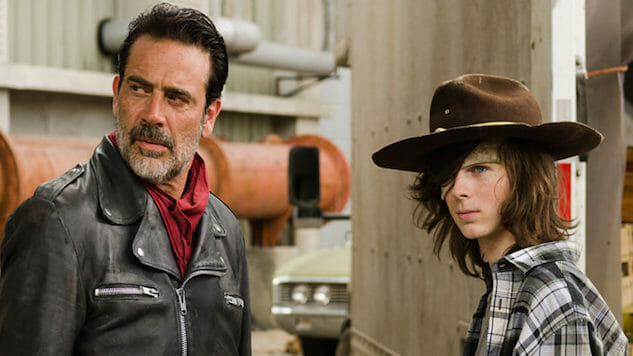The Solution to The Walking Dead‘s Pacing Problem Is Right There in the Comics
AMC
The Walking Dead is bigger—and slower—than it’s ever been. Sure, the series hit the narrative doldrums in Season Two, in what felt like a bout of needless wheel spinning, but those kinks seemed to have been ironed out in the time since. There’s a reason the series is one the decade’s biggest hits, and it’s because it’s (mostly) been pretty darn good. Then Season Seven came along. With Negan’s skull-bashing cliffhanger hanging over its head, The Walking Dead returned riding a mountain of hype, and to this point it’s had trouble delivering.
Ever since the Governor bit the dust a few years ago, fans of the series have been waiting with bated breath to meet the comic villain who made the eye-patched mayor of Woodbury look like a teddy bear. Negan is one of the most popular characters to come from the comic canon, and with the blockbuster casting of Jeffrey Dean Morgan in the role (arguably the most well-known actor the cast of relative unknowns has attracted to date), you knew AMC was going to milk it for all it’s worth. Which didn’t necessarily have to be a bad thing. But with Sunday’s midseason finale upon us, it’s become clear that The Walking Dead is content to keep kicking dirt around the sandbox it’s created, instead of moving on to new terrain. Rather, it’s starting to feel like the AMC series’ creative team would prefer to play with the shiny, new Jeffrey Dean Morgan action figure they just pulled out of the box, Lucille and leather jacket included. The Walking Dead has never been the fastest-paced series on TV, but it once possessed a certain narrative energy—which is saying something, especially for a series whose premise is basically that it’s an endless apocalypse.
Much of that prior success can be traced back to Robert Kirkman’s immensely successful comics (still going, by the way), which the series has mined again and again for key story elements, sometimes panel by panel. Yes, the TV series has taken some liberties along the way (Andrea is dead, Carol is alive and awesome, Daryl exists, etc.), but they’ve largely kept the bones of Kirkman’s story in place. Which makes the frustratingly slow start to Season Seven all the more, well, frustrating. The framework is there, and they’re actually following it, for the most part—they just need to do it with more urgency. Considering that Kirkman’s been telling this story for 13 years and 160 issues (and counting), there are still seasons’ worth of material from the comics to adapt, and more being written with each new issue. So why spend eight episodes—several of them super-sized—meandering around the realization that Negan is a Really Bad Dude?
Put simply, there is no reason. We’re at the midseason break, and you could’ve skipped all but one or two episodes and not missed much. That’s not a good thing. And looking to the comics, that seems to be something Kirkman already knows.
-

-

-

-

-

-

-

-

-

-

-

-

-

-

-

-

-

-

-

-

-

-

-

-

-

-

-

-

-

-

-

-

-

-

-

-

-

-

-

-








































